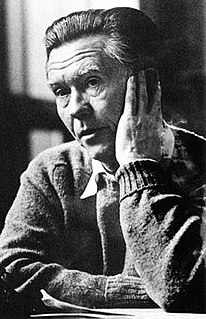A Quote by Barbara Kruger
The so-called language of Barbara Kruger is vernacular language. Obviously, I pick through bits and pieces of it and figure out to some degree how to objectify my experience of the world, using pictures and words that construct and contain me.
Related Quotes
We believe we can also show that words do not have exactly the same psychic "weight" depending on whether they belong to the language of reverie or to the language of daylight life-to rested language or language under surveillance-to the language of natural poetry or to the language hammered out by authoritarian prosodies.
All the characters are made out of words. With reading, I understand that the people aren't real but the fact that they are made out of language and are made out of words is extremely powerful to me. It becomes transformative for me. Different people have different ways of trying to make stories using language.
Language designers want to design the perfect language. They want to be able to say, 'My language is perfect. It can do everything.' But it's just plain impossible to design a perfect language, because there are two ways to look at a language. One way is by looking at what can be done with that language. The other is by looking at how we feel using that language-how we feel while programming.
That is a horrible thing in a way, but it is the one thing poets can bring back to experience, this intense focus on language, which activates words as a portal back into experience. It's a mysterious process that's very hard to articulate, because it's focused entirely on the material of language in a way, but in the interests not just of language itself whatever that would mean - that's the mistake, by the way, that so many so-called "experimental" poets make - but in service to human experience.
I have this feeling of wending my way or plundering through a mysterious jungle of possibilities when I am writing. This jungle has not been explored by previous writers. It never will be explored. It's endlessly varying as we progress through the experience of time. These words that occur to me come out of my relation to the language which is developing even as I am using it.
Being a slow reader would normally be a deficiency; I found a way to make it an asset. I began to sound words and see all those qualities - in a way it made words more precious to me. Since so much of what happens in the world between human beings has to do with the inconsideration of language, with the imprecision of language, with language leaving our mouths unmediated, one thing which was sensuous and visceral led to, in the use of language, a moral gesture. It was about trying to use language to both exemplify and articulate what good is.
Obviously people's feelings are going to get hurt when you use certain words, but you can't outlaw words. They're really the history of our culture. They tell you what's going on. When you make words politically incorrect you're taking all the poetry out of the language. I'm pro anybody living their lives the way they want to live, sexually and otherwise; and I'm anti any kind of language repression.
UG [universal grammar] may be regarded as a characterization of the genetically determined language faculty. One may think of thisfaculty as a 'language acquisition device,' an innate component of the human mind that yields a particular language through interaction with present experience, a device that converts experience into a system of knowledge attained: knowledge of one or another language.
Sound words can't be understood through formal study of the language alone. They're felt when you immerse yourself in the culture or lifestyle that becomes a part of you. The Japanese language is abundant with onomatopoeia. Even though I've lived in Japan a long time, sound words are still an uncertain territory. And I think new words are being created every day. Even when I don't know a word I can sometimes connect it to a meaning using the sensations produced by the sounds, which feels like I'm playing with words.
It has not been definitively proved that the language of words is the best possible language. And it seems that on the stage, which is above all a space to fill and a place where something happens, the language of words may have to give way before a language of signs whose objective aspect is the one that has the most immediate impact upon us.








































